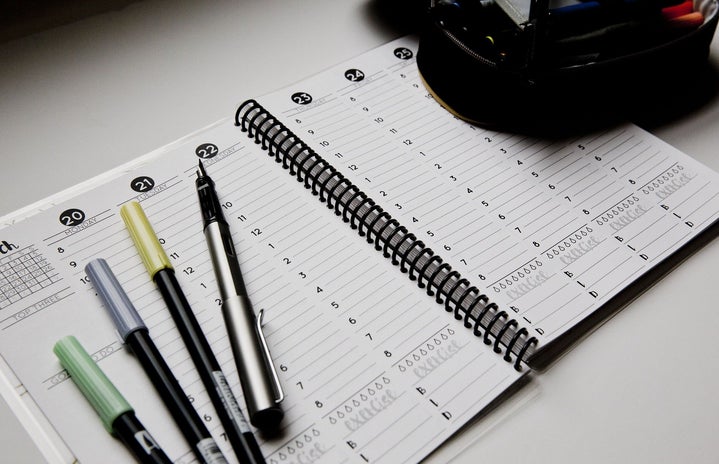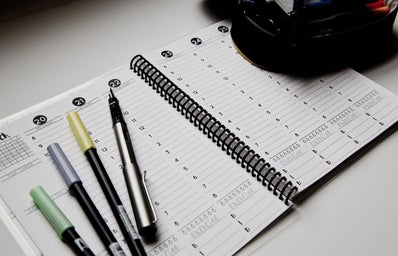1. See your professors (don’t over or under study)!
It’s really important to know what exactly is going to be on your test. You need to visit your professor before or after class and during their office hours to get a good understanding of what you need to know. If you don’t do this, you may waste your time, energy, and brain power studying too much and leaving out important details. You may also study the wrong thing or not give the material enough of your attention. Yes, under-studying is bad, but over-studying is harmful too! So talk to your professors and ask them for help. They’ll be more than willing to give you their input.
(Find their office hours on your Blackboard account or their course syllabus!)
2. Take advantage of free tutoring!
Unlike many college campuses, Siena allows free access to tutoring, so take advantage! Never be embarrassed to seek help, because we all need it. A lot of the time, people use tutoring not because they don’t know anything, but because they need practice, and either situation is perfectly fine! That’s what the tutors are here for: to help you with whatever you want on whatever level you’d like.
Make an appointment in the Siena College Writing Center or call them at (518)783-4125, partake in Drop-in Tutoring, ask a tutor or faculty member to fill out this Tutor Request Form for individual tutoring, or make a tutor request by visiting Siena Hall 215 or emailing Lynn Rogers at tutoring@siena.edu.
3. Where you study matters!
It’s incredibly important to study in a quiet place with no distractions. Too often people want to study in their most comfortable place, whether it’s in their dorm with the TV on in the background, in their bed with pop music playing on their speaker, in Casey’s while dinking a latte, or somewhere where there’s just too much going on. You should study wherever you can whenever you can, but make a point to do effective studying by going to the library and/or booking a study room, setting up in an empty classroom, or going to a usually vacant lounge area. The Grotto is a great place too! I’m sure there’s a special spot you know of on our beautiful campus! The less distractions, the more focus, the more you retain.
(Reserve a Siena College Study Room.)
4. Bring all that you need, leave all that you don’t!
One of the worst studying habits is allowing yourself to procrastinate and become side-tracked. Leave your phone, your music, your laptop (unless necessary), or even your homework, because all of these things will distract you from sitting down and effectively studying. You’ll even be tempted to start doing some random homework instead of memorizing and testing yourself on a subject. If you are studying for your history midterm, bring your history notes, handouts, and textbooks, and don’t bring anything else! Same goes for every subject, because you will subconsciously do anything, even if the alternative is also boring, to prevent you from studying. You also need to make sure you actually bring everything you need, so that you don’t waste time going back to your dorm to get it or contemplating whether or not it’s important—when in doubt, bring it! Food is important too. If you know you’re going to have to eat, pack something.
5. Outline and rewrite your notes!
Muscle memory is a real thing, ladies. People learn so much better by writing versus just reading. Practice makes perfect! You may think it’s too time consuming, but believe it or not, re-writing everything allows you to memorize the material much quicker as opposed to you reading it, closing your eyes, and trying to recite it, so you save a lot of time in the long-run! Plus, it’ll be well worth it because you’ll retain the knowledge in a much more understanding and memorized way! It also helps a substantial amount when you put things into your own words, because then you have a better, organized understanding of the material.
6. Create and play memory games!
Make studying fun! Flashcards are an excellent way to memorize vocabulary or processes. Use index cards or access study games online for your specific textbook or your general topic. There is more out there than you could ever imagine! There are literally tons of study apps. The best way to learn is to make learning interesting, and you are more than capable of doing this yourself. Even if it means creating a song that helps you remember the function of organelles or color coding authors and their works, do whatever you need to in order to make the information stick.
Some great sources include Duolingo (language app), Quizlet (flashcards), and Cram (flashcards).
7. Study with and without friends!
Doing both of these things is essential to your success. You need to study on your own in order to get a good understanding of the content and to differentiate the “do-knows” from the “don’t-knows.” Studying on your own allows you to test yourself as if you were really taking the exam, and you’re able to identify your strengths and your weaknesses. When by yourself, work on building your knowledge of what you don’t know. The next essential part is to study with people. This allows you to hear insight on something you may not have known and feedback on your understanding of something that could be tweaked. It’s important to test each other and to have a well-structured, serious discussion on the topic. Group study sessions should emphasize practice and helping each other’s understanding of the content.
8. Make a realistic schedule!
Do not study when you have time; make time to study. The sad reality of it is—we will never actually have time to study, mostly because we just don’t want to. With this mentality, you will never give yourself enough time to know the material well and you’ll always be underprepared. You have to make a point to work study times into your schedule. Just make it realistic. You don’t need to put in five-hour study sessions three times a week, break it up and balance your priorities. Time management! Do an hour or two here and there, and maybe one long session a week. Also, be sure not to cram it all in the week before the exam. Plan your schedule a few weeks in advance. This will relieve stress and be much more effective. Really though, we should all study throughout the whole semester…LOL.
(Get this My Homework app and your life will be saved!)
9. Take breaks!
Don’t think you have to sit down for hours on end with your face in a book. If you do this, you’ll hardly remember a thing. You need to allow yourself to be treated. After thirty minutes, take a water break. Or maybe you’d prefer to step outside for a short walk after two hours. If you can’t focus because your stomach is grumbling so loud, grab some food (that you should have brought with you) and take five to ten minutes. Make sure you socialize with someone too after a few hours of going at it. It’s important to not lose yourself, catch some fresh air and sun, stay replenished, and have a small conversation every now and then.
10. Stay healthy!
As much as people stress it and we still don’t abide by it, it really is important to stay away from coffee, get a good night’s sleep, maintain a healthy diet, and exercise. Keeping our bodies healthy keeps our minds working. Coffee doesn’t actually keep you awake, in fact, it shuts down your brain even more. It just makes your body jittery and distracts you from closing your eyes. Eight hours of sleep a night does wonders. Sure, this might mean sacrificing a party, but it’s for your health and your grade. There are plenty of other parties that will be thrown that you’ll be more than capable of attending. Also, good food is brain food. Fruits, vegetable, healthy carbs (whole grains and wheat), portion sizes, and basically anything that isn’t junk provides your body with nutrients that keep you awake, your body active, and your brain thinking. Water is the most important thing you could intake while studying, so stay hydrated! Then there’s exercise, but who has time for that right? Well, although going to the gym or going for a run is fantastic and much enforced, exercising also means just going for a walk in the fresh air or taking a quick bike ride. Exercising gives oxygen to the brain, and the more oxygen the better!
The most important thing to remember is that studying is the most important thing you could do for your grade and your intellectual growth in college, so although it seems like you don’t have time for it, make it your priority and schedule time for it. You’re more than capable of succeeding, and your potential is out of this world, as long as you allow it to be. Stay focused, stay strong, and study. Best of luck with your exams!

